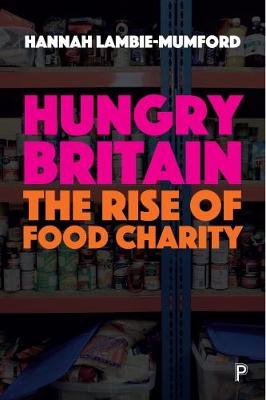5%OFF

Stock image for illustration purposes only - book cover, edition or condition may vary.
Hungry Britain: The Rise of Food Charity
Hannah Lambie-Mumford
€ 37.99
€ 36.15
FREE Delivery in Ireland
Description for Hungry Britain: The Rise of Food Charity
Paperback. Drawing on empirical research with the UK's two largest Food Banks, this book explores the prolific rise of food charity over the last 15 years and its implications for overcoming food insecurity. Num Pages: 216 pages. BIC Classification: JKS. Category: (P) Professional & Vocational. Dimension: 234 x 156. .
Drawing on empirical research with the UK's two largest Food Banks, this book explores the prolific rise of food charity over the last 15 years and its implications for overcoming food insecurity. The book argues that effective, policy-driven solutions require a clear rights-based framework, which enables a range of actors to work together to protect the right to food for all in the UK.
Drawing on empirical research with the UK's two largest Food Banks, this book explores the prolific rise of food charity over the last 15 years and its implications for overcoming food insecurity. The book argues that effective, policy-driven solutions require a clear rights-based framework, which enables a range of actors to work together to protect the right to food for all in the UK.
Product Details
Publisher
Policy Press
Format
Paperback
Publication date
2017
Condition
New
Number of Pages
192
Place of Publication
Bristol, United Kingdom
ISBN
9781447328292
SKU
V9781447328292
Shipping Time
Usually ships in 7 to 11 working days
Ref
99-50
About Hannah Lambie-Mumford
Dr Hannah Lambie-Mumford is Research Fellow at the Sheffield Political Economy Research Institute, University of Sheffield. Hannah's research focuses on food poverty and insecurity, the rise of emergency food provision and the human right to food. Hannah has undertaken research on these issues as part of RCUK and government funded projects. Hannah also sits on Child Poverty Action Group's (CPAG) ... Read more
Reviews for Hungry Britain: The Rise of Food Charity
Lambie-Mumford argues effectively for the state to recognise and protect the fundamental right to food and draws attention to areas in which a charitable response, while allowing an avenue through which to enact values of care, proves insufficient. It can be recommended to readers with the additional hope that it spurs further discussion about the implications of foodbanks in the ... Read more
